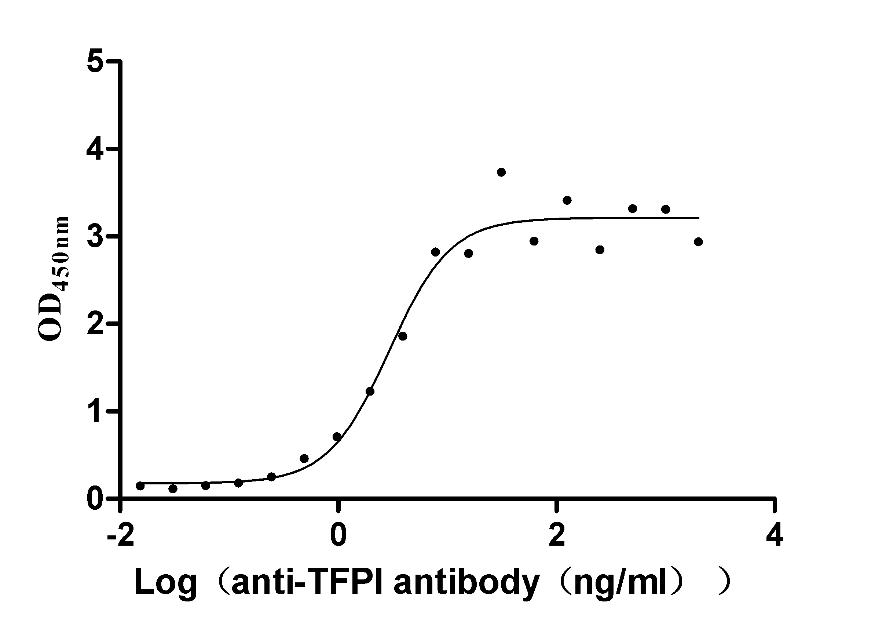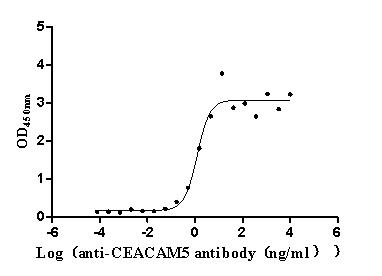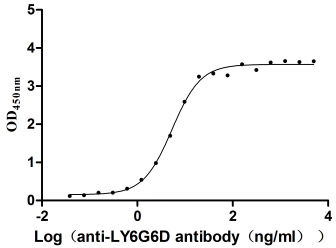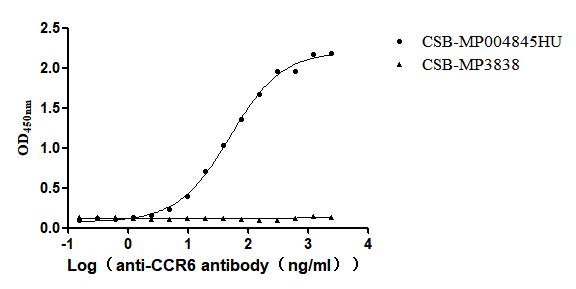Recombinant Human S-phase kinase-associated protein 2 (SKP2)
-
货号:CSB-YP613392HU
-
规格:
-
来源:Yeast
-
其他:
-
货号:CSB-EP613392HU-B
-
规格:
-
来源:E.coli
-
共轭:Avi-tag Biotinylated
E. coli biotin ligase (BirA) is highly specific in covalently attaching biotin to the 15 amino acid AviTag peptide. This recombinant protein was biotinylated in vivo by AviTag-BirA technology, which method is BriA catalyzes amide linkage between the biotin and the specific lysine of the AviTag.
-
其他:
-
货号:CSB-BP613392HU
-
规格:
-
来源:Baculovirus
-
其他:
-
货号:CSB-MP613392HU
-
规格:
-
来源:Mammalian cell
-
其他:
产品详情
-
纯度:>85% (SDS-PAGE)
-
基因名:
-
Uniprot No.:
-
别名:CDK2/Cyclin A associated protein p45; Cyclin A/CDK2 associated protein p45; Cyclin-A/CDK2-associated protein p45; F box protein Skp2; F box/LRR repeat protein 1; F-box protein Skp2; F-box/LRR-repeat protein 1; FBL 1; FBL1; FBXL 1; FBXL1; FLB 1; FLB1; MGC1366; p45; p45skp2; S phase kinase associated protein 2 (p45); S phase kinase associated protein 2; S-phase kinase-associated protein 2; S-phase kinase-associated protein 2 E3 ubiquitin protein ligase; SKP 2; Skp2; SKP2_HUMAN
-
种属:Homo sapiens (Human)
-
蛋白长度:full length protein
-
表达区域:1-424
-
氨基酸序列MHRKHLQEIP DLSSNVATSF TWGWDSSKTS ELLSGMGVSA LEKEEPDSEN IPQELLSNLG HPESPPRKRL KSKGSDKDFV IVRRPKLNRE NFPGVSWDSL PDELLLGIFS CLCLPELLKV SGVCKRWYRL ASDESLWQTL DLTGKNLHPD VTGRLLSQGV IAFRCPRSFM DQPLAEHFSP FRVQHMDLSN SVIEVSTLHG ILSQCSKLQN LSLEGLRLSD PIVNTLAKNS NLVRLNLSGC SGFSEFALQT LLSSCSRLDE LNLSWCFDFT EKHVQVAVAH VSETITQLNL SGYRKNLQKS DLSTLVRRCP NLVHLDLSDS VMLKNDCFQE FFQLNYLQHL SLSRCYDIIP ETLLELGEIP TLKTLQVFGI VPDGTLQLLK EALPHLQINC SHFTTIARPT IGNKKNQEIW GIKCRLTLQK PSCL
-
蛋白标签:Tag type will be determined during the manufacturing process.
The tag type will be determined during production process. If you have specified tag type, please tell us and we will develop the specified tag preferentially. -
产品提供形式:Lyophilized powder
Note: We will preferentially ship the format that we have in stock, however, if you have any special requirement for the format, please remark your requirement when placing the order, we will prepare according to your demand. -
复溶:We recommend that this vial be briefly centrifuged prior to opening to bring the contents to the bottom. Please reconstitute protein in deionized sterile water to a concentration of 0.1-1.0 mg/mL.We recommend to add 5-50% of glycerol (final concentration) and aliquot for long-term storage at -20℃/-80℃. Our default final concentration of glycerol is 50%. Customers could use it as reference.
-
储存条件:Store at -20°C/-80°C upon receipt, aliquoting is necessary for mutiple use. Avoid repeated freeze-thaw cycles.
-
保质期:The shelf life is related to many factors, storage state, buffer ingredients, storage temperature and the stability of the protein itself.
Generally, the shelf life of liquid form is 6 months at -20°C/-80°C. The shelf life of lyophilized form is 12 months at -20°C/-80°C. -
货期:Delivery time may differ from different purchasing way or location, please kindly consult your local distributors for specific delivery time.Note: All of our proteins are default shipped with normal blue ice packs, if you request to ship with dry ice, please communicate with us in advance and extra fees will be charged.
-
注意事项:Repeated freezing and thawing is not recommended. Store working aliquots at 4°C for up to one week.
-
Datasheet :Please contact us to get it.
相关产品
问答及客户评论
I am interested in CSB-EP613392HU.I would like to know if you can guarantee that this product/protein does not have any large aggregates, and is folded properly? If so, can you provide this evidence?
靶点详情
-
功能:Substrate recognition component of a SCF (SKP1-CUL1-F-box protein) E3 ubiquitin-protein ligase complex which mediates the ubiquitination and subsequent proteasomal degradation of target proteins involved in cell cycle progression, signal transduction and transcription. Specifically recognizes phosphorylated CDKN1B/p27kip and is involved in regulation of G1/S transition. Degradation of CDKN1B/p27kip also requires CKS1. Recognizes target proteins ORC1, CDT1, RBL2, KMT2A/MLL1, CDK9, RAG2, FOXO1, UBP43, YTHDF2, and probably MYC, TOB1 and TAL1. Degra...显示更多
-
基因功能参考文献:
- MiR-339 targets the 3'-untranslated region of Skp2 mRNA to depress the proliferation of lung cancer cells. PMID: 29377618
- Report that YAP is subject to non-proteolytic, K63-linked polyubiquitination by the SCF(SKP2) E3 ligase complex (SKP2), which is reversed by the deubiquitinase OTUD1. The non-proteolytic ubiquitination of YAP enhances its interaction with its nuclear binding partner TEAD, thereby inducing YAP's nuclear localization, transcriptional activity, and growth-promoting function. PMID: 29891922
- BTrCP-FBXW2-SKP2 axis forms an oncogene-tumour suppressor-oncogene cascade to control cancer cell growth with FBXW2 acting as a tumour suppressor by promoting SKP2 degradation. PMID: 28090088
- Result demonstrated that the overexpression of S-phase kinase-associated protein 2 (Skp2) was closely involved in the resistance of osteosarcoma cells to methotrexate and in the acquirement of EMT properties. PMID: 29620168
- The role of USP18 in breast cancer provides a novel insight into the clinical application of the USP18/AKT/Skp2 pathway. PMID: 29749454
- SKP2 promotes HCC progression and its nuclear functions of autophagy induction with CARM1 and AMPK, which may provide a potential target for HCC therapy. PMID: 29991055
- The results of the present study revealed that miR340 serves a tumor suppressor role by influencing the proliferation, apoptosis, migration and invasion of HCC cell lines, which may be explained by the downregulation of SKP2 by miR340. PMID: 28944918
- Our findings revealed that targeting Skp2 could be a promising therapeutic strategy for the treatment of Osteosarcoma PMID: 28627672
- Levels of p21 and p27 were decreased in TACO or pAKT overexpressing HCC due to SKP2 upregulation. PMID: 27779207
- Skp2 exhibited an oncogenic function in osteosarcoma cells. PMID: 28771075
- The results suggest that Skp2 repression is important for sustaining tetraploid G1 arrest after cytokinesis blockade and is required to prevent uncoupled DNA replication and nuclear division without cytokinesis. PMID: 28648144
- DCUN1D3 has a role in activating SCFSKP2 ubiquitin E3 ligase activity through cullin-1 neddylation and cell cycle progression in tumor cells with UV damage PMID: 27542266
- The expression of p-Skp2 was associated with p-mTOR in GC cell lines and tissues. Interestingly, the combination of p-Skp2 and p-mTOR was a better predictor of survival than either factor alone PMID: 28446188
- Atorvastatin strengthens Skp2 binding to FOXO1 or ICAM1, leading to ubiquitination and degradation. Skp2-dependent ubiquitination of major pathogenic molecules is the key mechanism for statin's protective effect on endothelial function in diabetes. PMID: 28802579
- we identified that rottlerin exhibited its anti-tumor potential partly through inactivation of Skp2 in breast cancer PMID: 27582552
- These findings indicated that SKP2 inhibition sensitized the prolactinoma cells to bromocriptine and helped promote apoptosis. PMID: 27488872
- Skp2 suppressed p53 and inhibited PIG3-induced apoptosis, while Skp2B attenuated the function of PIG3 by inhibiting PHB. PMID: 27111245
- Data suggest that targeting S-phase kinase associated protein 2 (SKP2) may serve as a potential radiosensitizer for developing effective therapeutic strategies against cervical cancer. PMID: 27317767
- Data indicate a positive correlation of Skp2 and MTH1 expression in melanoma cell lines and patient specimens. PMID: 28947420
- These results indicated that at least some oncogenic functions of BAG3 were mediated through posttranscriptional regulation of Skp2 via antagonizing suppressive action of miR-21-5p in ovarian cancer cells. PMID: 28624440
- High SKP2 expression is associated with Non-Small Cell Lung Cancer. PMID: 28872922
- Skp2-mediated degradation of Cygb was identified as the key mechanism for controlling its oscillating levels during the cell cycle. PMID: 28948618
- FOXM1 may play a central role in the skp2-cdk1 loop driving tumor progression. PMID: 27684411
- simvastatin also increased p21 and p27 expression in tumor sections by reducing Skp2 expression and inducing AMPK activation and STAT3 suppression in the same tumor tissues. PMID: 28230855
- Structural mimicry by a bacterial AnkB to human Skp2 hijacks the host ubiquitin-proteasome system. PMID: 28111017
- p27 and its cognate ubiquitin ligases, Skp2/KPC/Pirh2, are specifically involved in determining the clinical profiles of lung carcinomas. PMID: 28601655
- direct interactions of MAGE-A11 with Skp2 and cyclin A regulate the substrate-specificity of Skp2-mediated protein degradation. PMID: 27720894
- abnormal levels of Skp2 and p27(KIP1) have probably been involved in the pathogenesis of ADH and DCIS. Thus, Skp2 and p27(KIP1) may serve as important diagnosis markers PMID: 28514182
- High SKP2 expression is associated with lung cancer. PMID: 28789966
- our results revealed a novel mechanism in which EZH2 stability is regulated by SKP2 through the TRAF6-mediated and K63-linked ubiquitination, which contributes to elevated levels of H3K27me3 during prostate tumorigenesis and CRPC growth. PMID: 27869166
- Data demonstrate that AMPKa2 protein levels are reduced in bladder cancer and that this reduction is correlated with an increase in SKP2 expression with a concomitant reduction in p27 protein levels. PMID: 27638620
- SKP2 expression can inhibit radiation induced bystander effect of esophageal cancer cells. The mechanism may function, at least partly, through the regulation of Rad51 in the ability to repair DNA damage. PMID: 28178195
- AMPK deficiency results in nuclear CARM1 decrease mediated in part by SKP2, contributing to autophagy dysfunction in the aged heart. PMID: 28315332
- Higher expression of Skp2 correlates with lower expression of p27kip1 in gastric cancer tissues. PMID: 27572672
- The suppression of Skp2 reduced the enzyme activities of MMP-2. PMID: 26874697
- Data suggest that mternally expressed gene 3 (Meg3) long non-coding RNA and microRNA miR-3163 may coordinate suppression of translation of S-phase kinase associated protein 2 (Skp2) mRNA in non-small cell lung cancer (NSCLC) cells to inhibit cell growth. PMID: 26482610
- Data suggest that SIRT2 may induce Skp2 deacetylation and subsequent degradation to abolish the effects of Skp2 on p27 to affect NSCLC cell growth. PMID: 26942878
- High expression of SKP2 is associated with non-muscle invasive urothelial bladder carcinoma. PMID: 26932430
- HDACIs effects on Skp2 protein posttranslational modifications and/or on its removal PMID: 26682002
- miR-186 has a suppressive role in esophageal squamous cell carcinoma progression via SKP2-mediated pathway PMID: 26568291
- Patients with breast cancer have an increased SKP2 level. Interference in SKP2 gene expression can inhibit breast cancer cell growth. PMID: 26345857
- High expression of SKP2 is associated with Advanced Ovarian Cancer. PMID: 26320455
- Results demonstrate that curcumin exerts its antitumor activity through inhibition of glioma cell Skp2 pathway. PMID: 26046466
- TRUSS is a novel substrate of E3 ligase Skp2. PMID: 26038816
- Overexpression of LKB1 and Skp2 is found in hepatocellular carcinoma patients and predicts poor survival outcomes. PMID: 25728766
- The Skp2-mH2A1-CDK8 axis has a critical role in breast cancer development via dysregulation of the G2/M transition, polyploidy, cell growth dysregulation, and loss of tumor suppression. PMID: 25818643
- the Skp2mediated degradation of p27kip1 was important in the proliferation of tumor cells. The present study, therefore, provided a molecular reference for the treatment of liver cancer. PMID: 25572801
- Over-expression of Skp2 resulted in the increased cell growth and number of S phase cells in Skp2 transfected MCF-7 cells PMID: 26429528
- Caffeic acid phenethyl ester induced cell cycle arrest and growth inhibition in prostate cancer cells via regulation of Skp2, p53, p21Cip1, and p27Kip1. PMID: 25788262
- Particularly for TNBC associated with Skp2/LRP6 overexpression. PMID: 25358452
收起更多
-
亚细胞定位:Cytoplasm. Nucleus.
-
数据库链接:
HGNC: 10901
OMIM: 601436
KEGG: hsa:6502
STRING: 9606.ENSP00000274255
UniGene: Hs.23348


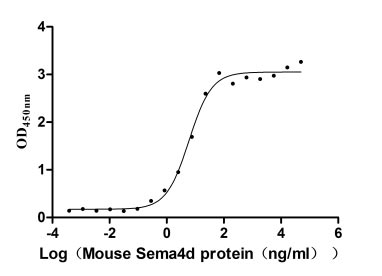
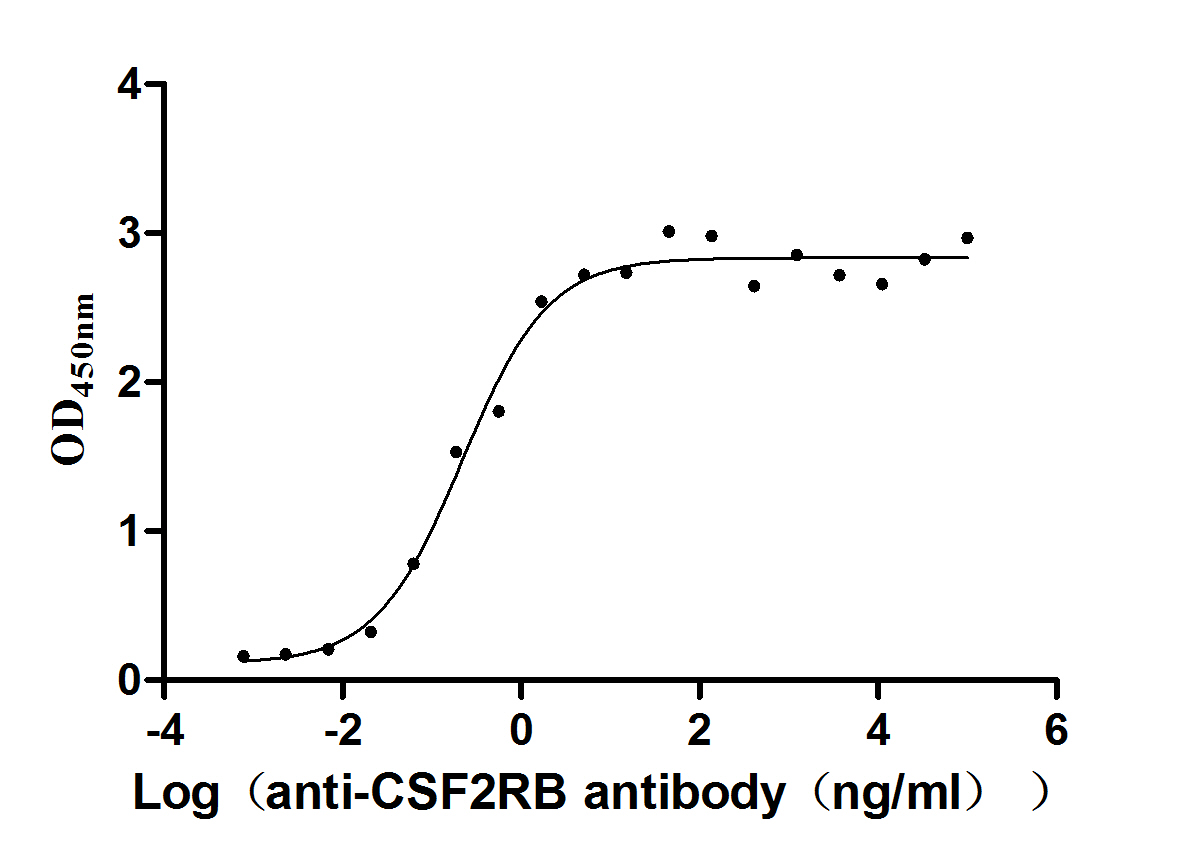
-AC1.jpg)
